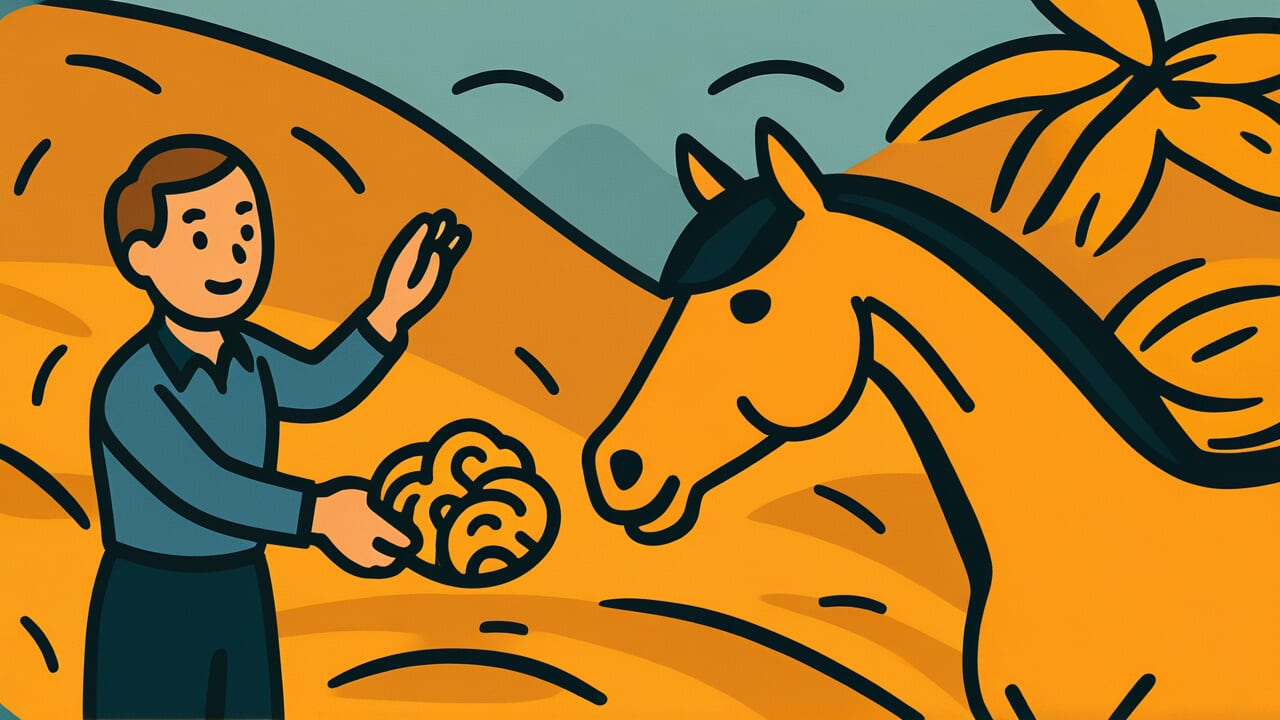How to Read “Feeding much millet yet the horse grows thin”
Awa wo kyūsuru koto ōkushite uma yasu
Meaning of “Feeding much millet yet the horse grows thin”
This proverb means that just as a horse grows thin despite being fed plenty of millet, good results won’t come from effort alone if the method is wrong. Even when you increase quantity or frequency, the expected results won’t appear if the approach itself is mistaken.
In fact, it can even backfire.
This saying is used when someone’s effort is misdirected or when methods need rethinking. For example, studying long hours but grades don’t improve, or making many sales visits but closing no deals.
People use this proverb not to say “you’re not trying hard enough” but to make a constructive suggestion: “you should change your method.” In modern times, as efficiency and productivity become more important, this proverb’s perspective on “the importance of qualitative improvement” becomes increasingly meaningful.
Origin and Etymology
Multiple theories exist about the clear origin of this proverb. The theory that it comes from Chinese classics is considered likely, but there’s no established consensus on which text it first appeared in.
Looking at the phrase structure, the expression “feeding millet” is interesting. Millet has been used as horse feed since ancient times. “Kyūsu” means “to give,” expressing the careful attention given to care.
This proverb conveys practical wisdom about horse breeding. Horses are large livestock, and their health management was extremely important for agriculture, transportation, and military purposes.
It’s natural to think that feeding horses more will make them healthier. But in reality, various factors matter: feeding methods, timing, balance with exercise, and more.
Simply increasing quantity can cause indigestion or health problems from lack of exercise. From such practical experience, the lesson emerged that “quality and method matter more than quantity.”
Wisdom born from the specific context of horse breeding eventually became passed down as a universal lesson applicable to all human endeavors.
Usage Examples
- Studying 10 hours every day but grades aren’t improving? That’s feeding much millet yet the horse grows thin
- Giving subordinates too many detailed instructions and actually hindering their growth is exactly the state of feeding much millet yet the horse grows thin
Universal Wisdom
The universal truth this proverb reveals is the trap of “obsession with quantity” that humans easily fall into. When we face difficulties, we tend to think “I need to try harder” or “I need to do more.”
This is easy to understand and gives us a tangible sense of effort.
However, what’s truly needed is often a transformation in quality, not quantity. Why do people forget this simple truth? Because changing methods is scary.
Rejecting our current approach feels like admitting all our previous effort was wasted, creating psychological resistance.
Also, increasing quantity is concrete and measurable, while improving quality feels abstract and uncertain. People tend to avoid uncertainty and cling to what seems certain.
This proverb has been passed down for so long because it sees through this fundamental human weakness. Our ancestors taught us the danger of misdirected effort through the familiar example of horse breeding.
True wisdom, this proverb quietly tells us, is having the courage to stop and reconsider your methods.
When AI Hears This
A horse’s digestive system is specialized for fermenting fiber as an herbivore. When fed large amounts of high-starch feed like millet, rapid chemical reactions occur in the intestines.
Specifically, when starch is broken down by intestinal bacteria, large amounts of lactic acid are produced. The intestinal pH drops from a normal 6.5 to below 5. This is called digestive acidosis.
This acidic environment change triggers a cascading collapse. First, beneficial bacteria that break down fiber die off, replaced by explosive growth of lactic acid-producing bacteria.
Then the intestinal wall becomes inflamed, and the villi that absorb nutrients get damaged. In other words, despite being fed high-calorie food, the intestines can’t absorb nutrients.
When acid enters the bloodstream, the body’s metabolic balance breaks down. Muscles start being broken down for energy.
Human diets high in carbohydrates have the same structure. Consuming large amounts of refined carbohydrates disrupts the balance of intestinal bacteria and causes chronic inflammation.
This creates the contradictory state of being obese yet malnourished. Modern people with sufficient calories but deficient in vitamins and minerals, suffering from persistent fatigue, are caught in the same metabolic trap as horses overfed with millet.
Lessons for Today
What this proverb teaches you today is the importance of “the courage to stop.” When results don’t come, we tend to push ourselves: “I need to try harder.”
But what’s truly needed is to stop once and ask, “Is this method right?”
Modern society treats “effort never betrays you” as a virtue. But effort in the wrong direction only exhausts you. Studying while cutting sleep is meaningless if concentration drops. Working overtime is counterproductive if productivity falls.
What matters is not blaming yourself for “not trying hard enough” when results don’t come. Instead, think flexibly: “Let me try a different method.” This isn’t giving up.
It’s a strategic choice to approach your goal more wisely and effectively.
Your effort is precious. That’s exactly why you should have the courage to reconsider your methods sometimes, so that effort bears fruit. That’s what true wisdom means.



Comments